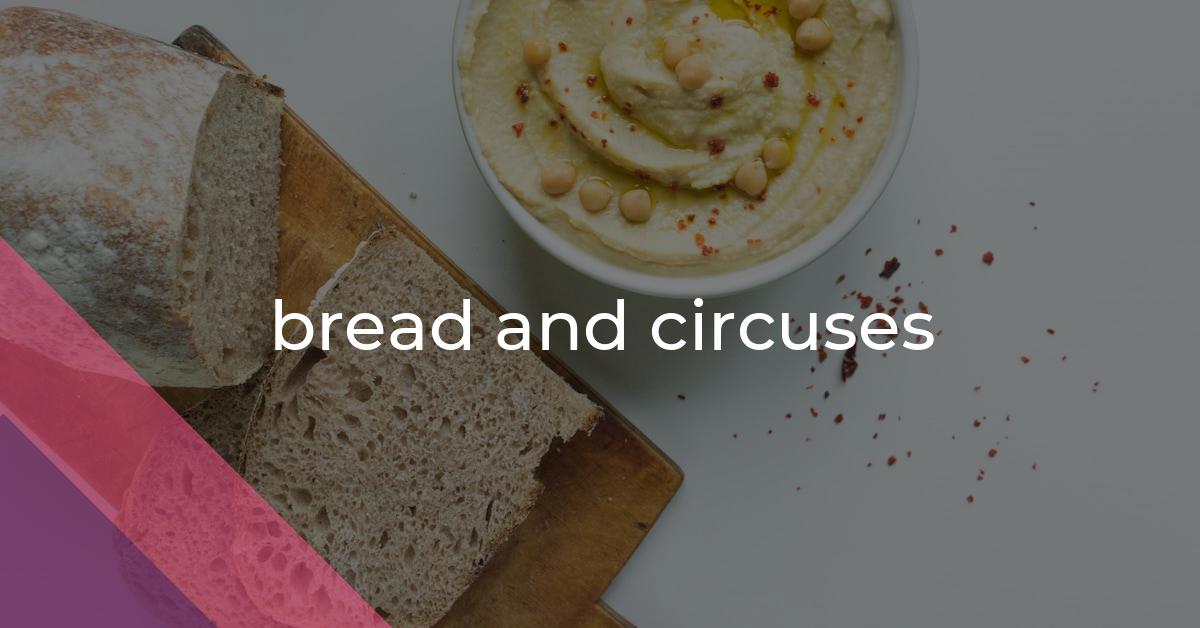bread and circuses: Idiom Meaning and Origin
What does ‘bread and circuses’ mean?
The idiom "bread and circuses" refers to using superficial entertainment and material goods to distract people from real issues and problems. It originates from ancient Rome, where the government provided free food and staged spectacles to keep the population content and distracted from political matters.

Idiom Explorer
The idiom *fun and games* means that a situation is enjoyable and entertaining, but it can also imply that there are hidden difficulties or challenges involved.
The idiom "for show" means doing something only to give the appearance of it, without any real substance or intention behind it.
Fool's paradise is an idiom that refers to a situation or state where someone is happily deceived or living in delusion, unaware of the reality or impending trouble.
The idiom "fiddle while Rome burns" means to engage in trivial or pointless activities while a serious situation or crisis is happening.
The idiom "feast or famine" means a situation where there are extreme and unpredictable fluctuations between abundance and scarcity. It implies that there is either too much or too little of something, with no middle ground.
The idiom "emperor's new clothes" refers to a situation where someone is praised or respected without actually deserving it, often due to fear or collective delusion.
Deciphering the Illusion
The idiom "bread and circuses" originated from ancient Rome and refers to the practice of providing superficial or trivial means of appeasement to distract people from more important issues or problems. This idiom is derived from the Latin phrase "panem et circenses," coined by the Roman poet Juvenal in his Satires. It has been used frequently in political and social commentary to criticize governments and the media for diverting the public's attention from significant matters.
In ancient Rome, the emperors employed the strategy of distributing free food (bread) and hosting grand spectacles (circuses) to maintain social order and control the masses. By offering free food and entertaining spectacles, the emperors aimed to divert the attention of the people from political corruption, economic issues, and social unrest. This strategy was a way of keeping the public occupied and preventing them from focusing on the more significant problems at hand.
Just as in ancient Rome, where the provision of bread and circuses was used as a form of manipulation, modern governments and media outlets have been accused of employing similar tactics. The phrase "bread and circuses" has gained popularity as a metaphor for a government's attempt to appease or control its citizens through shallow and temporary means. It implies that a society can be easily distracted or pacified by trivial or superficial pleasures, rather than focusing on issues that truly matter.
The idiom "bread and circuses" is rooted in the concept of diversion. It suggests that the public can be swayed or placated by providing them with temporary pleasures, rather than addressing substantive problems. This metaphor serves as a reminder to remain vigilant and not to overlook significant issues merely because of shallow distractions.
The idiom "bread and circuses" finds relevance in modern society, where the media and governments are often criticized for distracting the public from important matters. This idiom warns against getting caught up in trivial distractions and emphasizes the importance of addressing substantive problems. It reminds us that we should not be easily appeased by temporary pleasures or shallow entertainment.
song and dance is related to the idiom "bread and circuses" in the sense that both involve providing entertainment to distract the public. While "bread and circuses" specifically refers to the Roman practice of distributing free food and hosting grand spectacles, "song and dance" refers more generally to the act of using lively performances or distractions to divert attention from more serious matters. In both cases, the aim is to keep the masses occupied and prevent them from focusing on significant issues.
bread and butter is another idiom related to "bread and circuses." While "bread and circuses" refers to the provision of trivial means of appeasement to distract people, "bread and butter" refers to someone's main source of income or livelihood. Both idioms suggest that people can become complacent or easily satisfied with superficial or materialistic pleasures. In the case of "bread and circuses," the distraction is provided by external sources such as the government or the media, while "bread and butter" focuses on an individual's personal sustenance or source of stability.
brain candy is a term used to describe entertainment or media that offers superficial or trivial enjoyment. It is related to the idiom "bread and circuses" in the sense that both involve providing distractions or entertainment that do not necessarily contribute to the betterment of individuals or society as a whole. "Bread and circuses" refers specifically to the Roman practice of diversion, while "brain candy" is a more modern term that encompasses all forms of entertainment or media that prioritize amusement over substance.
The idiom "fiddle while Rome burns" is related to "bread and circuses" as both concepts involve distractions and the neglect of important issues. "Fiddle while Rome burns" refers to a person who displays indifference or apathy in the face of looming disaster or crisis. The idiom implies that while something important is happening or deteriorating, the person in question is occupied with trivial or irrelevant matters. Similarly, "bread and circuses" suggests that the public can be easily distracted or pacified by shallow or temporary pleasures, neglecting more significant problems at hand.
dog and pony show is another idiom related to "bread and circuses." While "bread and circuses" refers to the Roman practice of diverting the public with free food and grand spectacles, "dog and pony show" refers more broadly to any flashy or exaggerated performance intended to impress or distract. Both idioms depict the act of providing entertainment or distractions to divert attention from more important matters, whether it be by the Roman emperors or by individuals or organizations in a modern context.
Example usage
Examples of how the idiom bread and circuses can be used in a sentence:
- The government keeps the population distracted with bread and circuses to prevent them from focusing on critical social issues.
- In the modern era, reality TV shows and sports events can be seen as a form of bread and circuses that distract people from more pressing matters.
- Some argue that the excessive consumerism in our society is a result of the constant offering of bread and circuses by corporations.
More "Entertainment" idioms



